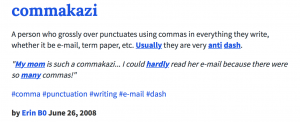
Grammar doesn’t tend to be a topic that students are enthused about. Whenever I mention it, many of my students roll their eyes. To really get a non-reaction, all I have to do is mention punctuation and their eyes glaze over. Not a pretty sight. However, grammar – and more importantly punctuation – is essential, so I have tried many ways to make this topic clear and interesting.
There is always humor, which will catch their attention, but most likely not clarify the finer points of punctuation. The famous comma for cannibals quote (“Let’s eat grandpa” as opposed to the more humane “Let’s eat, grandpa”) can make students smile once they understand. So now I have more of their attention. But that is just the beginning.
Attention, alas, doesn’t guarantee success. I have tried listing the most common comma rules used and explaining in detail with examples as to how and why these rules are used. The result is for students to comma-kazi or as the Urban Dictionary defines it:

The result could be called comma overkill, and in a way, it is a positive sign that students are at least listening and trying. This, however, doesn’t guarantee success. Another time I tried to get students to actively apply the rules in a creative way. One student did an interactive comma quiz that was well received by the class. Ironically this student “covfefed” on the final task and ended up comma-kazing on the write up.
Another option is a bit more drastic. Even though threats are seldom helpful, it still is tempting to use death by comma argument. In 1916 Sir Roger Casement was hanged, partially due to a discrepancy about the correct comma placement in a legal document. The truly desperate instructor can therefore point out that people have literally been hanged on a comma. Nowadays students’ grades – but not their lives – could possibly suffer the same fate…
Perhaps students just aren’t aware of the importance of commas. Humor didn’t seem to work, neither did active application and death grade threats just simply aren’t an option. Thanks to a news article in The New York Times, I have now found one very motivating reason for my students: money. Due to Oakhurst Dairy’s ambiguous use of the serial or Oxford comma, the company could have to pay up to 10 million dollars in overtime. This brings home the point about being very clear about comma usage. If you are interested in the grammatical details of the Oakhurst misadventure, Grammar Girl provides an enlightening take on “The $10 Million Comma.”
Using the money angle to prove the importance of proper comma usage inspired a change in my approach: less is more. Basically, I analyze the type of comma mistakes that my classes commonly make before I teach the comma rules. Since most of my classes tend to have homogenous German native speakers, it was easier for me to discover the two main perpetrators: dependent clauses using subordinating conjunctions (because, since, although and co.) and dass (that). In these cases, the native language functions in override and displaces the English comma rules. I now concentrate on explaining the precise way to correct this override error for these two points only and practice this. Many times. Quite often. Amazingly, this will clear up anywhere between 20–40% of the comma mistakes for most students. Phenomenal! Everyone is happy and enjoys the feeling of success.
It’s very doubtful that my students will ever learn to love commas or even think they are sexy in a “comma-sutra” way, but at least they don’t hate them and their eyes tend not to glaze over… as much. As an English instructor you may at times sound pedantic or be considered a stickler about these obscure linguistic artifacts, but money talks and, in this case, maybe it can even ‘buy’ love.
16,058 Total Views, 7 Views Today






